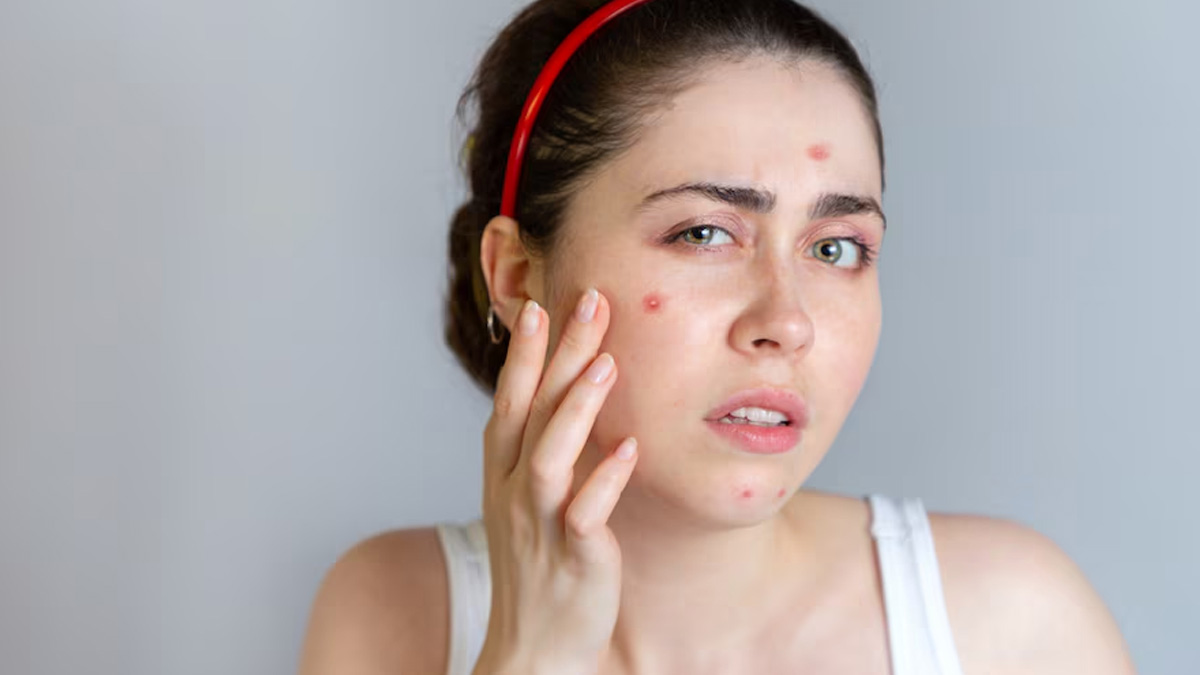
Acne occurs when pores in your skin become blocked by oil, dead skin cells, and bacteria. Period acne occurs due to the same reason but is triggered by the hormonal fluctuations that begin in the days leading up to your menstruation.
Table of Content:-
Throughout the menstrual cycle, hormone levels constantly change. However, right before your period, a week or two to be precise, oestrogen and progesterone levels drop, which causes your oil glands to go into an overdrive, producing more oil than usual. This excess oil combines with dead skin cells and bacteria, clogging your pores and leading to those breakouts. While distressing and unappealing to look at, period acne usually resolves on its own or with proper management strategies. In this article, we list five effective measures you can take to get some relief from such breakouts.
Also Read: Hormonal Acne: Expert Explains The Connection And Treatment Measures
A Healthy Diet Is A Must

Eating healthy foods can not only prevent but also help manage various conditions, including skin-related issues. Whether it be regular acne or premenstrual syndrome (PMS)-induced acne, a diet rich in vegetables, fruits, whole grains, and healthy fats can provide relief and reduce further breakouts. Moreover, it is crucial to avoid certain foods like sugar, processed foods, and alcohol.
Regular Exercise
Exercise itself doesn't cure acne; however, it can help manage it. Regular workouts help regulate blood sugar levels, an excess of which can trigger the production of hormones that increase oil production, a major cause of acne.
Exercise also improves blood circulation, bringing oxygen and nutrients to the skin cells and flushing out waste products. Thus promoting healing and reducing inflammation. Moreover, physical activity helps relieve stress, which can worsen acne.
However, it is important to maintain good skin care hygiene while exercising, as it can lead to excessive sweating, leading to a buildup of oil, dirt, and bacteria on your skin, according to the American Academy of Dermatology Association (AADA).
Stress Management

During your menstrual cycle, your hormones are already fluctuating. This can trigger your oil glands to overproduce sebum, leading to clogged pores and breakouts. Acne only worsens when your body is under stress, as it releases cortisol, which disrupts the delicate balance between hormones that were already causing problems for your skin.
Managing your stress often includes exercising regularly, indulging in relaxation techniques like yoga and meditation, and sleeping adequately.
Can Hormonal Treatments Help?
Period acne occurs when oestrogen and progesterone levels decrease right before your menstruation. This causes your oil glands to go into overdrive, clogging pores and causing breakouts. Hormonal treatments can help address this issue.
Birth control pills containing both oestrogen and progesterone can regulate hormone levels and reduce sebum production. The AADA shares that they have been found effective at treating blackheads, whiteheads, pimples, and acne nodules and cysts.
In fact, the US Food and Drug Administration (FDA) has approved the use of some oral contraceptives for treating acne.
Additionally, medications like spironolactone, which has anti-androgen properties, can be prescribed to specifically target hormonal imbalances that contribute to acne, the health body notes. However, it is important to consult a doctor or dermatologist to discuss the best hormonal treatment option for your specific situation and needs.
Follow A Proper Skincare Routine

While period acne is natural and there is not much you can do about it, following a proper skincare routine can help provide relief and prevent further complications. This includes washing your face twice a day with a gentle cleanser and avoiding scrubbing. You should invest in skincare products rich in salicylic acid, as it acts as a gentle exfoliator, which helps remove obstructed pores and diminishes inflammation. Moreover, ingredients like benzoyl peroxide have antimicrobial properties that fight acne-causing bacteria. Avoid substances such as alcohol, fragrances, and abrasive exfoliants, and apply sunscreen to protect your skin from Ultraviolet (UV) rays.
Conclusion
Period acne can be extremely problematic, especially when it becomes painful. While hormones are the biggest culprit, other factors, such as stress, physical inactivity, an unhealthy diet, and a poor skin care regimen, can worsen the condition. Therefore, it is crucial to take the necessary measures against such breakouts and consult with a doctor to determine the triggers specific to you
Also watch this video
How we keep this article up to date:
We work with experts and keep a close eye on the latest in health and wellness. Whenever there is a new research or helpful information, we update our articles with accurate and useful advice.
Current Version